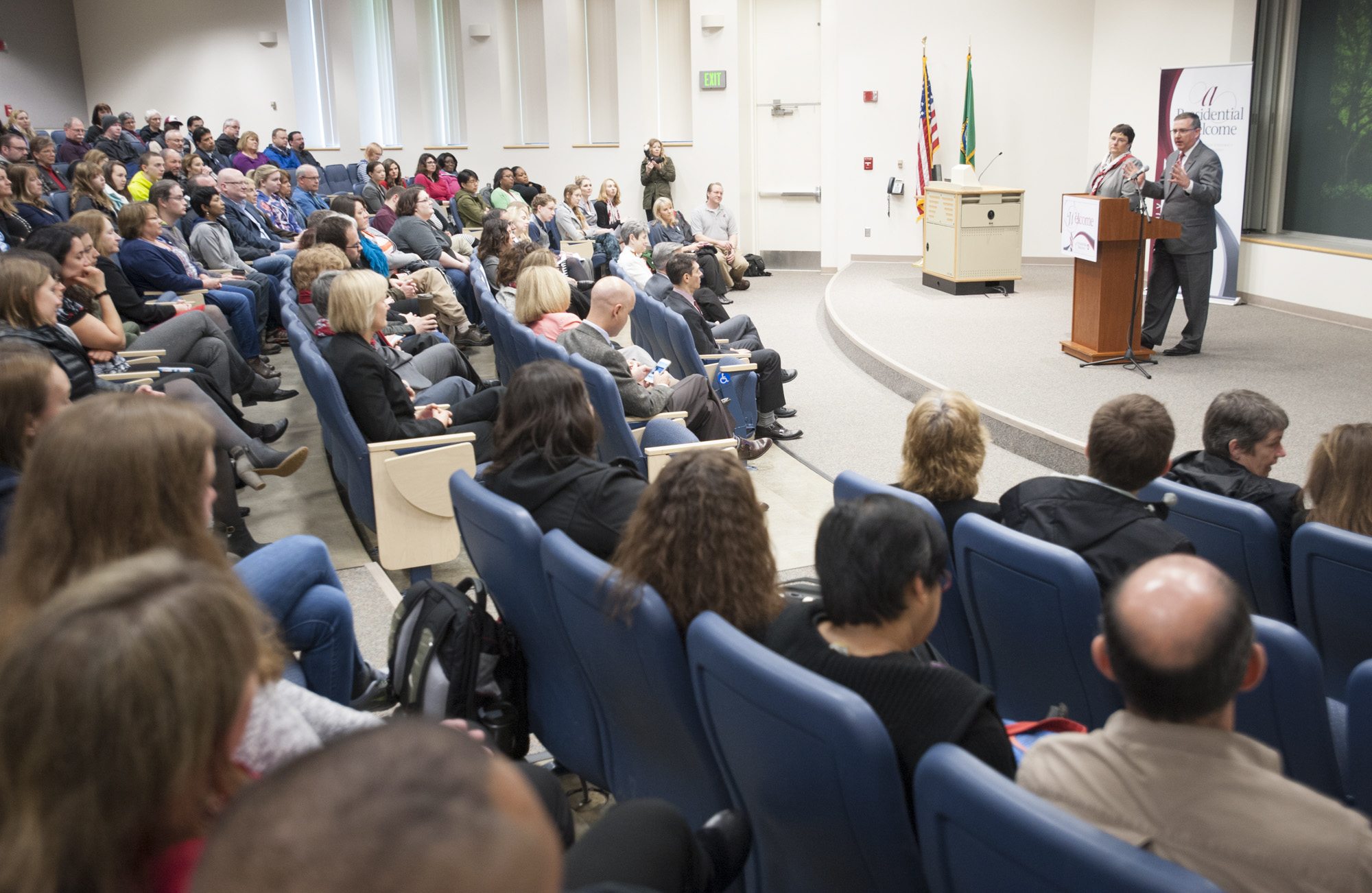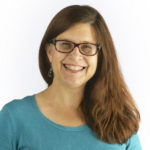Waving crimson flags, the VanCougs were out in full force to welcome Washington State University President-elect Kirk Schulz and his wife, Noel Schulz, Monday morning to the WSU Vancouver campus.
Schulz toured all five of the WSU campuses — Pullman, Tri-Cities, Spokane, Vancouver and Everett — over a whirlwind tour Friday and Monday.
Named to the top job less than two weeks ago, Schulz will be the university’s 11th president since 1890. He succeeds Elson Floyd, who died from complications from colon cancer on June 20.
Currently Schulz is president at Kansas State University in Manhattan, Kan., and a professor of chemical engineering there.
New WSU president-elect
• Name: Kirk Schulz.
• Current position: President, Kansas State University.
• Other job: Chair, NCAA Board of Governors.
• Academic background: Professor of chemical engineering.
• Twitter:@WSU_Cougar_Pres
On Monday, the Schulzes stepped out of a sedan that pulled up to the sidewalk where a group of faculty and staff stood waiting. Immediately, Kirk and Noel Schulz began shaking hands.
“Debbie. Nice to meet you. Rennie. Nice to meet you. Kirk Schulz here,” he said.
Standing on the sidewalk, Daniel J. Bernardo, interim president of WSU, looked toward Schulz and said: “He’s a really experienced leader. He’ll fit in well.”
Bernardo, who was named interim president following Floyd’s death, has been the university’s provost and executive vice president. Bernardo and Schulz both have worked at Kansas State University.
Schulz was unanimously selected by the WSU Board of Regents on March 25. Regent Michael Worthy of Vancouver served as chair of the 25-member presidential search committee. Worthy traveled around the state to ask alumni what they wanted in the next president.
“When we did the opportunities and challenges document laying out the characteristics Cougs said they wanted in a president, well, (Schulz) has them all — leadership, commitment to academic quality, administrative skills to complete the strong trajectory WSU is on,” Worthy said.
“This was not an easy task,” said WSU Vancouver Chancellor Mel Netzhammer, who also served on the search committee. “Our candidate and president-elect was so impressive at every opportunity.”
Schulz spoke to faculty, staff, students and community members in the Dengerink Auditorium on Monday. He didn’t make a proclamation about the direction he intends to take WSU. Instead, he said he would take time to visit all campuses, talk to the chancellors, faculty, staff and students.
“I will learn more. It will take time to get to know each campus,” Schulz said. “The last thing you want is someone coming in talking about what they did at their previous institution.”
He acknowledged he would spend time on all five campuses and learn about their differences.
“It’s like your children. They all have different opportunities and strengths,” he said.
The average undergraduate student at WSU Vancouver is 26 — much older than the average student on the Pullman campus.
“Sometimes universities, if we aren’t careful, are completely geared up for 18- and 19-year-old students,” Schulz said. “Each campus is going to have a different style. Different needs.”
Coug assets
Schulz highlighted several assets that drew him to apply for the top job at the state’s second-largest university.
Regarding the development of the Elson S. Floyd College of Medicine on the Spokane campus, he said: “I don’t know of another new major publicly funded medical school that’s part of a land grant university.”
WSU’s “academic reputation is very well known among other land grant universities,” he said.
He also cited the faculty’s “extremely high research achievement.”
A proponent of college affordability, Schulz said he was impressed when Washington was the only state that reduced tuition 15 to 20 percent at four-year institutions last year.
During a brief question-and-answer period, when Schulz was asked what he would bring to WSU to continue to keep the cost affordable for students, he mentioned open-access textbooks and materials.
He also touched on the need to find new funding sources.
“Sometimes higher education talks a higher ed language that not everybody else talks. We need to talk about return on investment. For 100 years, higher education said: ‘Give us money and trust us.’ We’ll have to be creative in finding alternative revenue sources.”
Schulz mentioned the importance of finding new opportunities for growing community partnerships. He also spoke about working with community and business leaders to ensure that WSU graduates are receiving the education that will make them best prepared to enter the workforce and be contributing members of society.
Schulz added that although WSU has “lots of success, it’s just not told well outside of this area. We’ve got great stories to tell. We’ve got to be more effective in telling that story.”
Although Schulz, his wife and their two sons pursued careers in science, technology, engineering and math, he talked about the value of liberal arts.
“How can we prepare a student to be successful in a career for 30 to 40 years? The arts and humanities play an important part of that.”
He touted his experience at KSU and two other land grant universities, Virginia Tech and Mississippi State.
Schulz cited the similarities between WSU and KSU. Both are land grant universities, both are research universities and both are isolated geographically. KSU is about 130 miles from Wichita. WSU is about 75 miles south of Spokane.
$13M athletic deficit
Schulz will have to tackle some pressing problems right away. For the second consecutive year, WSU’s athletic department ended its fiscal year with a $13 million deficit.
Schultz said he will sit down in the next six months with WSU Athletic Director Bill Moos and Bernardo “to put together a plan to make athletics sustainable. We have to find ways to close the gap,” he said.
He said that at the end of six months, he would make the plan public.
Schulz was named chair of the NCAA Board of Governors, the association’s highest-ranking committee, in January 2015. It is a two-year appointment.
He said he’s enthusiastic about collegiate athletics and their ability to shine the light on an institution.
“Athletics are an opportunity to brand yourself nationally,” he said.
“We should have great opportunities. Coug football is going to have a great season.”
Noel Schulz, an electrical engineer, will join the engineering department on the Pullman campus. The couple plan to relocate to Pullman in June.
Schultz joked that he had about 50 purple neckties in Kansas State colors. Before June, he will need to invest in some crimson Coug ties.
“I’ve had lots of suggestions on social media as to what to do with those ties,” Schulz chuckled. “Most are family friendly.”
Schulz said he would visit the Vancouver campus often. He encouraged faculty, staff and students to engage in an open dialogue about their campus.
“We want to know what great thing has happened on campus,” Schulz said. “Send us an email. Copy us on Twitter.”
Even their Corgi, Cayenne Schutz, has a Twitter account: @cayenne_1stdog.
But Noel Schulz added: “She’s very spirited. What the dog says is not necessarily what Kirk and I think.”




